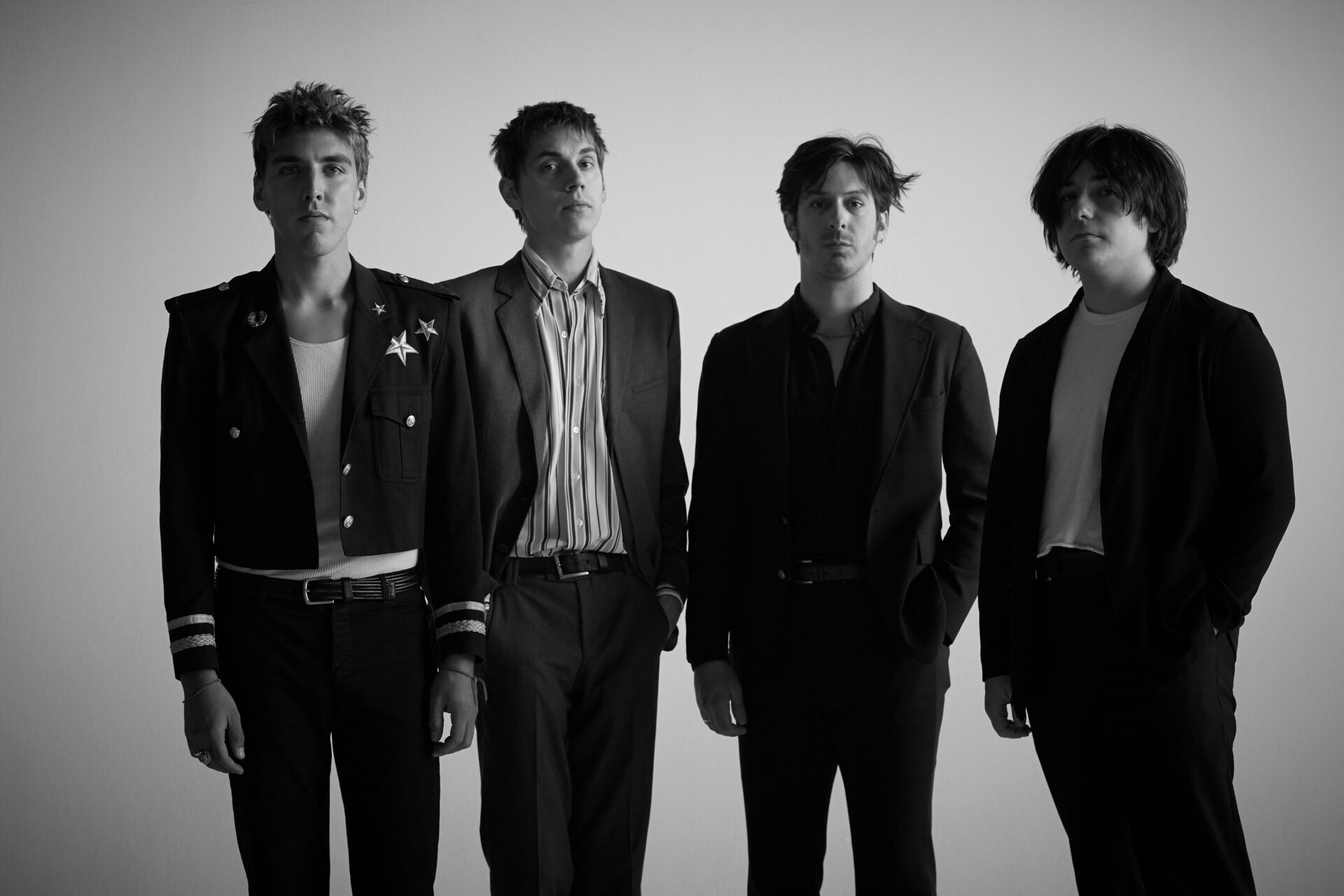In the two and a half years between Disappear Here and Mystic Truth, the four members of Bad Suns travelled, recorded songs in Airbnbs, and squished themselves into the same house. While these few years have been empty for Bad Suns fans without any new music, it was anything but for Christo Bowman, Gavin Bennett, Miles Morris, and Ray Libby— who had already had their third album underway even before they were finished touring for Disappear Here. And in the living room of the house all four members shared in the LA suburbs, the genesis of their third album emerged, and shaped itself over the course of those two years. Now, Bad Suns is finally ready for you to hear Mystic Truth, released this past Friday, March 22nd, via Epitaph Records.
Although Epitaph is their new label— home to artists with big, buoyant guitars and crash-bang rhythms— don’t be mistaken: this isn’t Bad Suns’s sudden foray into rough-and-tumble rock records with caustic guitars and relentless sound. In fact, this album actually feels even more toned down than any of their last, swapping guitars and acoustics for an ambitious experiment in piano-driven rock. It might sound incongruent to some— the prospect of being signed to a label famous for a sound so far unlike yours— but Bad Suns are so used to pushing the limits of their sound it’s unlikely they’ll stick out like a sore thumb. After all, isn’t that what rock is?
Produced by Dave Sardy, Mystic Truth came to life during fits of inspiration in a variety of locales: a midcentury geodesic dome on a desert wind farm, a barn in Bridgehampton, the streets of Hong Kong, the Tate Modern, and the living room in the LA suburbs that housed all four members of Bad Suns. It’s common knowledge now, but it’s worth mentioning that Mystic Truth‘s title was inspired by Bruce Nauman’s “The True Artist” installation, a long, spiraling work that recently resurfaced at London’s Tate Modern, which Bowman came across while on the “Disappear Here Tour.” “I need some kind of connection / I need divine intervention / Mystic truth,” Bowman sings on “Away We Go”, the lead single and track one of the album, and instantly, the tone of the album is set.
In true Bad Suns style, the album dissects emotions and life’s good moments with the poignancy and lyrical depth present throughout their entire back-catalogue, pairing Christo’s unwaveringly notable songwriting with the band’s renewed, reinvigorated approach to melodies via piano. Mystic Truth produces some of their catchiest choruses and uplifting moments to date, takes Bad Suns a step further, while still keeping listeners teetering upon that three-way line between rock & roll, post-punk, and pop. This album is very much a clean slate, as he tells us, and it does show. This is not to say songs from previous records are bogged down with the weight of old material, but it is to say that each song plays with the vigor of a renewed endeavor, the freshness of a new path. Each song in itself is an adventure, catching that hidden thread in you that just wants to forget yesterday and imagine better days. It may just be the light, refreshing piano that makes an appearance on almost every song, but it somehow feels like whatever we didn’t realize was missing on their first two albums (because they were, as Christo and I agreed, faultless snapshots of the time) is suddenly perfectly filled in.
While LP1 (2014’s Language & Perspective) and LP2 (2016’s Disappear Here) are fond memories for both Bad Suns and their listeners, Mystic Truth finally sees the band fully realizing exactly the drive and appeal they were going for in their first album: a healthy mix of and a bold sonic exploration of musical elements of times past. The album itself is easy listening— if you like one song, you like all. Standout tracks like “Darkness Arrives and Departs”— a strikingly optimistic take on dark times— and “Separate Seas” are strongly driven by rousing piano melodies that lead up to swelling, orchestral choruses, reminding us that bad times don’t last and that the future is in our hands. “One Magic Moment”, the second single off the album and a song that was pulled virtually out of thin air, searches with the same vigor for something magic in the mundane, and track three, “A Miracle, A Mile Away”, is the closest the band gets to their roots. It’s not one of those albums where the singles are the strongest and all else pales in comparison, falling lackluster against the electrifying buildup. Each song here can thankfully hold its own, something that’s both rare and hard to do (well, rare because it’s hard to do). The album finishes strong with “Starjumper”, and you can hear a sliver of influence from Disappear Here (2016). From the opening notes of “Away We Go” to the long closing note of “Starjumper” (or even “Love By Mistake”, the beginning of which suddenly sounds like something from 2014’s Language & Perspective), Bad Suns both reminds you of their past triumphs and depart from them, leaving you heavy with a sense of pride for how far they’ve come.
At the forefront of this soft-rock-turned-piano barrage is lead singer, guitarist, and now pianist, Christo Bowman, who has spearheaded the band long before that fateful day when they dropped a demo off in KROQ’s mailbox, tinged with teenaged hope. In the past, Bowman has been a master at the introspective, vague lyric, and somehow manages to tie significance into seemingly meaningless wording. This is no small feat, and “is a process of time” as he tells us below. He hasn’t failed to do that here: while songs are short, it’s not hard to grasp the deeper, uplifting meaning of it all. In anticipation of this morning’s release, we convened with Bowman earlier this week for a recap of their past two years touring, growing, and working on the album.
Substream: So your tour just ended! How was that? How has your week been?
Christo Bowman: It’s been good! We just wrapped up our last night here in Arizona. This tour has been really fun. It’s kind of like the precursor to the band’s album release tour that we’re doing next month, and now that we have a few songs out now, and its been really fun to be able to get back on the road finally and see people’s interactions and how they’re reacting to the new music. It’s been a lot of fun and we’re really excited to continue on touring.
Did you enjoy playing the new songs?
Christo: Oh yeah, it’s been a blast.
Since we’re on the subject of touring, is your songwriting ever influenced by being on tour? Do you ever feel super creative at that time, or is it the opposite because maybe you’re so tired?
Christo: It depends. like i know people who are able to write on the road all the time and it’s something that I’m definitely interested in but I feel like, so far, in our case, being on the road kind of ends up being more of a period to gather a lot of inspiration. When I get home from a tour, especially the longer ones where I tend to have a bunch of ideas brewing, I’ll sort of lock myself into our studio at night and just see what happens and throw things at the wall, and that’s a really fruitful time in general.
Have you ever really written any songs in the midst of tour?
Christo: I’m trying to think. Yeah, there’s a song on our new record called A Miracle Mile Away, which actually started well, we had an off-day in Albuquerque, New Mexico towards the end of 2017 when we were touring ‘Disappear Here’. And so we found a really cool recording studio and figured we’d spend our time wisely and go down to room and put on instruments and the genesis of that song sort of began there. That was a really fun process. There were also a couple of other tracks on the record which we were working on while we were in that room like “Separate Seas”, and a lot of times, especially if I already have kind of songs, but I tend to work on lyrics over time. It’s rarely that the first draft is the final song. It’s something I’m kind of working at continuously. So a lot of the times I’ll be on the road writing lyrics while we’re traveling and, you know, on airplanes. I have an easier time writing lyrics in transit for whatever reason.
Yeah, I definitely feel that. There’s a lot of inspiration on the road.
Christo: Totally. There’s some certain headspace I’m able to get into where there’s less… roadblocks.
[Laughing at roadblocks]. Switching gears a little bit: For the name of the album, did you pick the words ‘Mystic Truth’ for the title after you wrote “Away We Go”, or did it come about separately? Where did it come from?
Christo: Well, the phrase “Mystic Truth” is something that had come about right before we wrote “Away We Go”. So, that came first and I knew I wanted to try and fit that— I wasn’t sure whether I was going to— but I knew that I wanted to try and fit that somewhere into the lyrics of the album. That song ended up being the final resting place, and I think it worked out perfectly.
And is that why “Away We Go” is track one, or was that completely unintentional?
Christo: It kind of all just came together appropriately. On all three of our albums so far, it’s kind of been a similar case where, on the first record, ‘Language + Perspective’ is a lyric taken from the first song, “Matthew James”, and “Disappear Here” of course is the title track of the second record and that’s also track one, and ‘Mystic Truth’ this time comes from the lyrics of track one, “Away We Go”. And I don’t know if that was necessarily intentional, but I think that as soon as we had the music for “Away We Go”, it kind of declared itself as being the introduction to the record. That’s just what it felt like to us.
Do you always feel like you need to start over like completely from scratch each time you start a new album, or do you like draw from older things?
Christo: It depends. Of course, your first album is just you pulling from a lot of things, potentially years and years of material. For [Disappear Here], the same was kind of the case, where we had just written so many songs before we even got to the point to where we were recording albums, [and we had] some material that even predates the first record, and songs like “Maybe We’re Meant To Be Alone” and “Defeated”— those songs were written close to 10 years ago now. And then this time around we did take a different approach to where everything completely was from scratch. It was all fresh ideas. We didn’t really want to pull from the pool of material that we had; it just felt like there was a lot changing and a lot happening in our lives, and there was burst of creativity happening that we tried to ride the wave for as long as we could. So this time around it was completely fresh, and [the process] really started as soon as we released the second album and started touring and I got home from that first tour— the first song I got written was “Darkness Arrives (And Departs)”, and immediately it kind of signaled some sort of change for the better. I’m sure fans will understand what I’m saying in the sense that it is sort of like a declaration. It’s like a fresh slate almost.
I know that you guys haven’t really played any of the non-single songs live yet. What are you most excited to play?
Christo: That’s a good question. Really all of the songs. But if I had to narrow it down I would say probably “A Miracle, A Mile Away” and “Starjumper” too that I’m really excited about.
Yeah, those are really really good. I really liked Starjumper; it was different.
Christo: Thank you very much.
Of course. And so, in tandem, are there any songs in the album that went through so many changes before you were happy with them? Like the way we listen to it now it feels like it was all just a straight shot, but I know it probably took a lot to get it to where it is now. So, what songs were the hardest to feel satisfied with?
Christo: Hm, I’m trying to think what songs. I’d say that, looking back and thinking about all of them— to be honest this record was kind of a lot songs because we’d written a lot more songs than we actually ended up choosing for this record, and, as it sometimes tends to be, the ones that we ended up feeling the most inspired to include on the record/fully visualize and realize are the ones that appear from nowhere— they tend to come quickly. Songs like “One Magic Moment”, or “Hold Your Fire”, for instance, the two singles, those really kind of came like, immediately and suddenly, were written pretty much within a day. Like I said, lyrically its always a process of time but musically those really came together in a burst of creativity . Same with “Starjumper”, same with “Howling at the Sun”, same with “Darkness”, really same with mostly all of them. There are a couple of songs to where once we brought them into pre-production with our producer Dave Sardi— this was our first time working with somebody other than Eric Palmquist, who recorded our first two records— once we brought things into pre-production and we had the batch of songs and were starting to juice things, a couple of the tracks like “A Miracle Mile Away”, “The World and I”, (and then there was one more I can’t think of) ended up like: ‘okay, this song is really great, but we need a new chorus’. So then it was kind of my challenge— especially because these were songs that we were really passionate about but just maybe the chorus didn’t lift in the way that we needed— it was kind of my job to really quickly come up with a new one. But luckily that was also at a time when everyone was feeling really inspired and so we ended up writing some of our favorite choruses and it came really quickly. So that was nice. So yeah, I think “A Miracle, A Mile Away” may have been the one whose genesis took the longest, from start to finish.
I noticed that piano plays a very big role in these songs, more so than before. Was there anything specific that led you to this change?
Christo: Yeah, I think it was sort of a natural transition, in the sense that we had a piano in the house that we were all living in together when we were making the album, whereas in the past I’ve never had a piano at home— Gavin has, and Ray has, but when I was writing songs for the first two albums I didn’t really have access to a piano. So naturally all the songs were starting at guitar. But this time having that instrument around, and especially being in this kind of fertile state and looking for new inspiration and trying to pull songs out of the air, it ended up becoming a really good companion of mine. And some of the songs, for instance “Starjumper” actually began and was written on the acoustic guitar, and then by the time we brought it into pre-production, we decided to reimagine it as this piano song, and it ended up being one of my favorites. But I think in certain ways, it was intentional. We felt like the first album was kind of a declaration of who we were at that time. To us, ‘Disappear Here’ I think was kind of “us” [feeling] that we really were just a much better band at this point, and we had more sense of direction and purpose for what we were doing. And so [Disappear Here] was almost sort of the more fully-realized version of what we were trying to strive for the first time around [with Language & Perspective]. And then now [with this third album] we felt like we had accomplished that and that we were ready to move on to new territory for the time being.
I noticed that you don’t really have that many music videos. Do you think this album will spawn any of them?
Christo: Music videos have always been tough with us for some reason. It’s not ever been our forte. We’re the process of trying to come up with one for “One Magic Moment” right now, though, so hopefully we see a change to that. To be honest, it’s kind of been a point of frustration for me personally.
You answered this a bit already, but I do know that you guys were pretty young when your first album came out, so how do you guys feel now about the first record you put out?
Christo: I’m still proud of it, you know? I mean, I think it’s really what a record should be. It’s a snapshot of where we were at that time, and I look back on those days fondly. That record came out when I was 20, and this album is coming out now when I’m 24. So I mean like but at the same time like Summit like for instance songs like “Cardiac Arrest”, “We Move Like the Ocean”, “Matthew James”, and “Transpose”: when those were recorded, I was like 17 at the time. So it really was a while ago now but I still feel like I’m proud of the band that we were then, proud of ?? that we’re really kind of getting this place but we’re still we’re still on the path forward. I’m proud of us now and I look back on that record with fondness. I feel like it is a great memento of that period of time and when I listen to it I can’t help but think of the whole process and the times when we are making— it really was a great time for us.
Pick up Bad Suns’ Mystic Truth, out now on all platforms. The band is also touring in support of the album; dates here.













